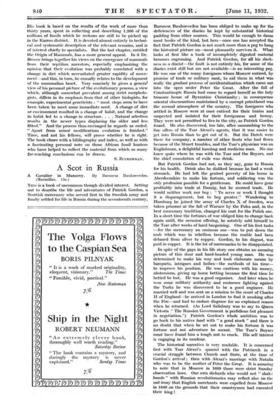A Scot in Russia
A Cavalier In Muscovy. By Baroness Buxhooveden. (Macmillan. 16s.) A Cavalier In Muscovy. By Baroness Buxhooveden. (Macmillan. 16s.) Tins is a book of uncommon though divided interest. Setting out to describe the life and adventures of Patrick Gordon, a Scottish mercenary who served first in the Swedish army and finally settled for life in Russia during the seventeenth century,
Baroness Buxhoeveden has been obliged to make up for the deficieneIes of the diaries he kept by substantial historical padding from other sources. This would be enough to damn most books of the kind, but hers—once one has accepted the fact that Patrick Gordon is not much more than a peg to hang the historical picture on—most pleasantly survives it. What looks at first like a book of incompletely digested material becomes engrossing. And Patrick Gordon, for all his slack- ness as a diarist—the fault is not entirely his, for some of the diaries exist still but are not available—is an interesting peg. He was one of the many foreigners whom Moscow enticed, by promise of trade or military rank, to aid them in what was really the gradual process of occidenta1ization which came out into the open under Peter the Great. After the fall of Constantinople Russia had come to regard herself as the holy treasure house of Byzantine Christians.., in consequence oriental obscurantism maintained by a corrupt priesthood was the normal atmosphere of the country. The foreigners who settled in Moscow were at once enticed for their brains and suspected and isolated for their foreignness and heresy. They were not permitted to live in the city, as Patrick Gordon found. He_ also discovered, too late, after succumbing to the fine offers of the Tsar Alexei's agents, that it was easier to get into Russia than to get out of it. But the Dutch were there for company, a number of other Scots who had flown because of the Stuart troubles, and the Tsar's physician was an Englislunan, a delightful humbug and medicine man. No one knew quite where he was with the Tsar and the Boyars, and the chief consolation of exile was drink.
But Patrick Gordon had not, as they say, gone to Russia for his health. Drink also he disliked because he had a weak stomach. He had left the genteel poverty of his home in Aberdeenshire to make his fortune, and soldiering was the only profession possible for a gentleman. He could have gone profitably into trade at Danzig, but he scorned trade. He would neither work nor beg : "To serve or work I thought it a disparagement, but to beg greater." Wandering to Hamburg he joined the army of Charles X of Sweden, was taken prisoner at the fall of Warsaw by the Poles and, in the best mercenary tradition, changed his coat for the Polish one. In a short time the fortunes of war obliged him to change back again until, the occasion offering, he astutely sold himself to the Tsar after weeks of hard bargaining. One of his first tasks —for the mercenary an ominous one—was to put down the mob which was in rebellion because the rouble had been debased from silver to copper. Gordon, to his disgust, was paid in copper. It is the lot of mercenaries to be disappointed.
In spite of the gaps in his life story one obtains an amusing. picture of this dour and hard-headed young man. He was determined to make his way and took elaborate means by banquets, intrigues and bribes—the methods of his time— to improve his position. He was cautious with his money, abstemious, giving up horse betting because the first time he betted he lost. He was a good organiser. And later when lie won some military authority and eminence fighting against the Turks he was discovered to be a good engineer. He married well and was sent on a mission to the court of Charles II of England—he arrived in London to find it smoking after the Fire—and had to endure disgrace for no explained reason when he returned. (As Lord Salisbury was to say to Queen Victoria The Russian Government is perfidious but pleasant in negotiation.") Patrick Gordon's whole ambition was to go back to his native land with "a good stock" and there is no doubt that when he set out to make his fortune it was fortune and not adventure he meant. The Tsar's Boyars must have found him a tough nut to crack. His self interest is engaging in its candour.
The historical narrative is very readable. It is concerned first with Tsar Alexei's quarrel with the Patriarch in a crucial struggle between Church and State, at the time of Gordon's arrival ; then with Alexei's marriage with Natalia who was to be the mother of Peter the Great. It is amusing to note that in Moscow in 1669 there were strict Sunday observation laws. Our own diehards who would not "shake hands" with Russian revolutionaries may reflect also on the sad irony that English merchants were expelled from Moscow in 1649 on the grounds that their countrymen had executed their king!


































 Previous page
Previous page